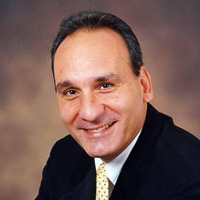Even Responsible Savers Make Retirement Mistakes
You've already done the hard work to stash away a nice nest egg for retirement. Don't blow it now. Here are four common missteps that people entering retirement should avoid.

Profit and prosper with the best of Kiplinger's advice on investing, taxes, retirement, personal finance and much more. Delivered daily. Enter your email in the box and click Sign Me Up.
You are now subscribed
Your newsletter sign-up was successful
Want to add more newsletters?

Delivered daily
Kiplinger Today
Profit and prosper with the best of Kiplinger's advice on investing, taxes, retirement, personal finance and much more delivered daily. Smart money moves start here.

Sent five days a week
Kiplinger A Step Ahead
Get practical help to make better financial decisions in your everyday life, from spending to savings on top deals.

Delivered daily
Kiplinger Closing Bell
Get today's biggest financial and investing headlines delivered to your inbox every day the U.S. stock market is open.

Sent twice a week
Kiplinger Adviser Intel
Financial pros across the country share best practices and fresh tactics to preserve and grow your wealth.

Delivered weekly
Kiplinger Tax Tips
Trim your federal and state tax bills with practical tax-planning and tax-cutting strategies.

Sent twice a week
Kiplinger Retirement Tips
Your twice-a-week guide to planning and enjoying a financially secure and richly rewarding retirement

Sent bimonthly.
Kiplinger Adviser Angle
Insights for advisers, wealth managers and other financial professionals.

Sent twice a week
Kiplinger Investing Weekly
Your twice-a-week roundup of promising stocks, funds, companies and industries you should consider, ones you should avoid, and why.

Sent weekly for six weeks
Kiplinger Invest for Retirement
Your step-by-step six-part series on how to invest for retirement, from devising a successful strategy to exactly which investments to choose.
There actually are people out there diligently saving for retirement.
Yes, you read that correctly. It may not seem like it, given the media’s constant focus on Baby Boomers’ shaky financial future. But there are pre-retirees who have been putting away money for decades in preparation for a long and happy retirement.
If you’re in that group, good for you.
From just $107.88 $24.99 for Kiplinger Personal Finance
Become a smarter, better informed investor. Subscribe from just $107.88 $24.99, plus get up to 4 Special Issues

Sign up for Kiplinger’s Free Newsletters
Profit and prosper with the best of expert advice on investing, taxes, retirement, personal finance and more - straight to your e-mail.
Profit and prosper with the best of expert advice - straight to your e-mail.
But even people who have been responsible with their money can run into challenges when they enter retirement. It requires a monumental shift in your mindset, and it’s easy to make mistakes.
Here are four missteps that even skillful savers need to learn to avoid:
1. Don’t become too enamored with cash.
I often find that people who are naturally gifted at saving money have far too much sitting in cash. And I understand that. Many fear investing in the market because of previous tumbles. In the last 16 years, we’ve had two major drops, and that puts people on edge.
It’s important to always have some emergency money available, but holding too much cash in your portfolio or in the bank opens you up to inflation risk. As the years pass, you’ll lose purchasing power. And then there’s the issue of taxes. If you keep your money in a taxable savings, money market, brokerage or other cash account, you’ll have an ever-growing tax liability. If safety is a priority, talk to your adviser about alternatives that protect your principal and offer a reasonable rate of return.
2. Don’t take too much risk.
If you’ve been enjoying this long-running bull market, like so many have, it’s likely your risk meter is broken. And again, that makes sense. If you lost money in your 401(k) or IRA back in 2000 or 2008, I’m sure you didn’t like it much, but if you were still working and earning a paycheck, it probably didn’t affect your day-to-day lifestyle. Your expenses were met and you were still contributing to your retirement accounts. But in retirement, you won’t have that paycheck anymore. And because your nest egg must generate income, market volatility can have a much greater impact.
Completely avoiding the markets is not a solution for most retirees — especially if you’re going to keep pace with inflation and retain the opportunity for growth and future income. But saving for retirement and planning for retirement are two different things. It’s important to take a balanced approach between income and growth to help prepare for good and bad economic times.
3. Don’t forget about the tax “time bomb.”
Tax planning should be a part of your decision-making as soon as you begin retirement planning. Believe it or not, taxes don’t end when you retire. Many people think they do — or, at least, they think taxes will be greatly reduced. That’s a myth — especially now, as so many retirees have most of their savings in tax-deferred accounts.
When you withdraw money from those accounts in retirement, you’ll be taxed on your contributions and the account growth. It may not seem like it, but today’s taxes are low compared to what past generations experienced. Do you think you’ll be alive when taxes are higher than they are now? Remember, the federal debt now stands at $20 trillion, and projections suggest that amount will continue to rise. Somebody is going to have to pay that bill.
Unfortunately, tax-deferred accounts are vulnerable to tax hikes. It’s probably a good idea to take advantage of those low rates while you can by working with a certified tax planner to help find ways to get your tax rate closer to zero. Some possibilities to explore include converting part of your traditional IRA each year to a Roth IRA. You’ll owe taxes on the amount converted, but it may be at a lower rate since you’re retired, and the Roth has no required minimum distributions.
4. Don’t neglect to live a little.
Some retirees have trouble remembering what they worked so hard to save for. They had an idea of the life they wanted in retirement, but they worry so much about running out of money, they let that dream go. A comprehensive retirement plan can help you transition from a saving mindset and help give you the confidence to spend on the things you always hoped and dreamed for, and for which you worked so hard to save.
Whether your retirement assets are modest or massive, there are common challenges for all retirees. From day one, you’ll need reliable income streams so you can pay your basic bills. That money will form the foundation for the rest of your retirement — and once that foundation is in place, you can build your lifestyle around it. Lifestyle income is the money you spend for fun, family, travel, adventure, etc. It’s going to fluctuate as the markets traverse their inevitable ups and downs, but it should be part of your plan.
Retirement shouldn’t be a time of worry and stress. It should be a time to relax and enjoy life after years of working. But just saving up a big stash of money isn’t enough to guarantee success. A plan that addresses current and future needs will help keep you on track and help you reach your retirement goals.
Kim Franke-Folstad contributed to this article.
Investment advisory services offered through Brookstone Capital Management, LLC (BCM), a registered investment advisor. BCM and Carolina Retirement Resources are independent of each other.
Investing involves risk, including the potential loss of principal. Any references to protection benefits or safety generally refer to fixed insurance products, never securities or investment products. Insurance and annuity product guarantees are backed by the financial strength and claims-paying ability of the issuing insurance company.
Profit and prosper with the best of Kiplinger's advice on investing, taxes, retirement, personal finance and much more. Delivered daily. Enter your email in the box and click Sign Me Up.

Dr. Richard Pucciarelli is the president and founder of Carolina Retirement Resources Inc. He has over 15 years experience serving retirees and pre-retirees in planning for and protecting their financial futures. Pucciarelli is an Investment Adviser Representative and a licensed insurance professional. He hosts the "Financial Symphony" show on WBT Radio 1110 AM every Saturday morning at 11 a.m.
-
 Nasdaq Leads a Rocky Risk-On Rally: Stock Market Today
Nasdaq Leads a Rocky Risk-On Rally: Stock Market TodayAnother worrying bout of late-session weakness couldn't take down the main equity indexes on Wednesday.
-
 Quiz: Do You Know How to Avoid the "Medigap Trap?"
Quiz: Do You Know How to Avoid the "Medigap Trap?"Quiz Test your basic knowledge of the "Medigap Trap" in our quick quiz.
-
 5 Top Tax-Efficient Mutual Funds for Smarter Investing
5 Top Tax-Efficient Mutual Funds for Smarter InvestingMutual funds are many things, but "tax-friendly" usually isn't one of them. These are the exceptions.
-
 Social Security Break-Even Math Is Helpful, But Don't Let It Dictate When You'll File
Social Security Break-Even Math Is Helpful, But Don't Let It Dictate When You'll FileYour Social Security break-even age tells you how long you'd need to live for delaying to pay off, but shouldn't be the sole basis for deciding when to claim.
-
 I'm an Opportunity Zone Pro: This Is How to Deliver Roth-Like Tax-Free Growth (Without Contribution Limits)
I'm an Opportunity Zone Pro: This Is How to Deliver Roth-Like Tax-Free Growth (Without Contribution Limits)Investors who combine Roth IRAs, the gold standard of tax-free savings, with qualified opportunity funds could enjoy decades of tax-free growth.
-
 One of the Most Powerful Wealth-Building Moves a Woman Can Make: A Midcareer Pivot
One of the Most Powerful Wealth-Building Moves a Woman Can Make: A Midcareer PivotIf it feels like you can't sustain what you're doing for the next 20 years, it's time for an honest look at what's draining you and what energizes you.
-
 I'm a Wealth Adviser Obsessed With Mahjong: Here Are 8 Ways It Can Teach Us How to Manage Our Money
I'm a Wealth Adviser Obsessed With Mahjong: Here Are 8 Ways It Can Teach Us How to Manage Our MoneyThis increasingly popular Chinese game can teach us not only how to help manage our money but also how important it is to connect with other people.
-
 Looking for a Financial Book That Won't Put Your Young Adult to Sleep? This One Makes 'Cents'
Looking for a Financial Book That Won't Put Your Young Adult to Sleep? This One Makes 'Cents'"Wealth Your Way" by Cosmo DeStefano offers a highly accessible guide for young adults and their parents on building wealth through simple, consistent habits.
-
 Global Uncertainty Has Investors Running Scared: This Is How Advisers Can Reassure Them
Global Uncertainty Has Investors Running Scared: This Is How Advisers Can Reassure ThemHow can advisers reassure clients nervous about their plans in an increasingly complex and rapidly changing world? This conversational framework provides the key.
-
 I'm a Real Estate Investing Pro: This Is How to Use 1031 Exchanges to Scale Up Your Real Estate Empire
I'm a Real Estate Investing Pro: This Is How to Use 1031 Exchanges to Scale Up Your Real Estate EmpireSmall rental properties can be excellent investments, but you can use 1031 exchanges to transition to commercial real estate for bigger wealth-building.
-
 Should You Jump on the Roth Conversion Bandwagon? A Financial Adviser Weighs In
Should You Jump on the Roth Conversion Bandwagon? A Financial Adviser Weighs InRoth conversions are all the rage, but what works well for one household can cause financial strain for another. This is what you should consider before moving ahead.
